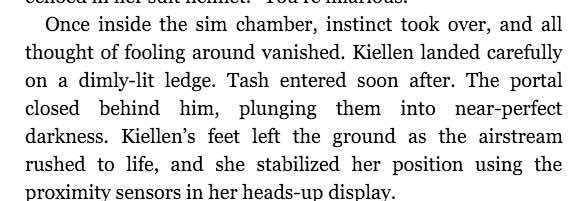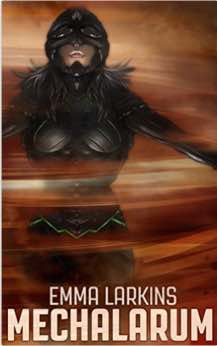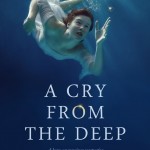
I met Emma Larkin a few years back at a writer’s meetup in New York where she gave a presentation about how she successfully crowd funded the self-publication of her sci-fi novel, Mechalarum. Since then, I’ve been failing to follow up on my offer to review her book, not responding to her emails in any rational period of time, and being as flaky as the flakiest members of Internet Town. So finally, after way too long, here is an interview with Emma Larkin about self-publishing and her novel. And while this comes too late for the free eBook she was offering at the end of November, this was clearly all part of my ongoing flaky plan with her – so now you need to spend $3 to buy an e-copy and support your friendly neighborhood indie author.

Excerpt from Mechalarum
Luke: A lot of self-published authors resort to self-publishing after vigorous attempts at traditional publishing. As for you, you researched traditional publishing and decided it wasn’t worth it, so opted for the rigors of self-publishing. Explain yourself here. Should traditional publishers be afraid of authors like you?
Emma: Be afraid, be very afraid! Just kidding, I’m mostly harmless..
I tend to overanalyze my decisions before I take action, which has pros and cons. Before I even considered publishing my novel I took classes, interviewed established authors, attended conventions, and read dozens of articles. The consensus was that it would take one to three years to get an agent (if I was lucky), and one to three years more to get a publishing contract (again, if I was lucky). So I was looking at two to six years from the time my novel was finished to the time anyone would be able to read it. I was far too impatient to wait that long.
In addition, I’d already learned how to do most of the tasks involved in publishing a book. I’d taken graphic design classes in college, and developed marketing materials for my employer. I’d been writing, editing, and doing layout for technical manuals for years. I’d delved deep into the world of marketing, social media, and building websites. I knew it would be a lot of work, but certainly not undoable.
And, best of all, I wouldn’t have to put up with a ton of people telling me my writing “just wasn’t a good fit.”
That being said, a lot of authors (including me, maybe, in the future) are still interested in the benefits of traditional publication. The only reasons traditional publishers should be afraid is if they’re unwilling to change their model to become more flexible. They certainly provide value: most authors don’t mind giving up a degree of control and revenue percentage in return for cover design, editing, marketing help, etc. As long as publishers recognize that authors have power and choice, and structure their offerings with that firmly in mind, they’ll be fine.

Excerpt from Mechalarum
Luke: Why has “self-published book” become a dirty word for readers but a liberating word for authors?
Emma: Self-publication offers authors plenty of benefits: faster turnaround times, recognition for their work, revenue that’s not filtered through a slew of middlemen. It’s liberating, but you have to realize the environment you’re jumping into.
The recent visibility of successful authors showed the world that writing is a profession that can lead to fame and fortune. And the accessibility of the internet made it easy for anyone to publish their work. Without any barriers to entry, the market became flooded with writers trying to make a quick buck and grab onto their fifteen minutes of fame.
It wasn’t just get-rich-quick schemers who jumped into the fray. There were also plenty of writers putting out books who just couldn’t see how bad their work was. It sounds harsh, but I’ve sat in on enough writing group meetings to know there are writers who simply refuse to listen to any feedback that isn’t “your book is the next Great American Novel.” These writers skipped the brutally honest beta readers and legitimate, paid editors, and their writing suffered because of it.
As a reader, it only takes a few bad experiences of paying for an unedited ebook that looks good on the outside but turns out to be crud to put up your defenses. It’s much easier to stick to the well-known titles and publishers, to let someone do the sifting for you. The “no self-published books welcome” sign on many book review blogs that goes along with this attitude is painful to see, but not unwarranted.

Luke: You said that if you could go back and do things over again you would’ve done more planning for both the book and your Kickstarter. What sort of planning and what sort of timeline do you think someone should have before they go into a self-publishing Kickstarter endeavor?
Emma: I had only two months to polish my draft, build an audience, and launch my campaign, due to an interesting intersection between my Kickstarter and my job at the time. Despite the time crunch, I was pleased with my video and description, and thought I had a valuable product to offer.
However, as soon as I launched, I learned the true reality of what makes Kickstarter a success. I’ve done my best to drill that truth into people’s heads ever since. The truth is this: Kickstarters build off of existing audiences. Throwing up your project on Kickstarter without an established platform, no matter how cool it is, is a recipe for disaster.
The other thing I learned is that editing your first book is a lot of work. I spent more than three hundred hours on it, all told, hours that I had to squeeze into my daily routine. As a result of this, my project was delivered a bit later than I’d hoped.
I would have ideally had my manuscript already edited when I launched my Kickstarter. People think that the Kickstarter will support their development of a project, but in most cases it works much better if your project is nearly complete. Then, I would have engaged more with people online and posted more of my writing on sites such as Wattpad and Scribophile, doing whatever I could to make readers aware of my work. Finally, I would have engaged with my close friends and contacts, building a ‘street team’ to rally around me and my work. I think six months, minimum, is the timeline you should be looking at. More if you’re starting from scratch with an audience of zero.
Luke: Where within the literary tradition do you see your book fitting? Are there any influences in it from off the wall places?
Emma: I’ve never thought about Mechalarum in terms of literary tradition – that’s a great question! Although it’s science fiction, it’s a pretty casual read, really an adventure story at heart. I almost want to say ‘pulp,’ though only the action is gratuitous, very little sex or violence. Readers have described it as cinematic – ‘it reads like a movie’ – which edges it almost into graphic novel or comic book territory, though without the pictures. It’s also strongly character driven. If there’s a word for all of that, I’d love to know what it is!
Luke: I hear some of your readers are asking you when the sequel is coming out. What is your plan for that? Will putting that together take away from your promotion and marketing of the current title, or do you see it all working together and adding to the ground work that you’ve laid with your first book?
Emma: I’m currently writing the sequel for Mechalarum as part of National Novel Writing Month. Title: Witherwelt. I’m working to more seamlessly integrate my writing and marketing, exploring a new pay-what-you-want model for Witherwelt that includes setting up a Patreon. I’ll be publishing a lot of the book online for free over the next year, helping me build my platform while giving people different, fun options to support my work. I’m also lucky to be working on this and other projects full time now, so that helps.
In addition, I find writing first drafts enjoyable and relaxing. I’ve been waiting a long time to tell this story, so it really doesn’t feel like work. When I get into the nitty-gritty editing process, that’s when it starts to take more time and energy. My marketing might suffer a bit at that point, but for now I’m just going with the flow.
It also helps that I love reaching out to and chatting with people about my work (and writing in general). And that just happens to be a good marketing technique!
***
Emma Larkins is a science fiction author and card game designer who loves puns. She writes accessible stories that tease the edges of your imagination without making you feel like your brain has gone through a blender.
Her Mechalarum ebook (“Strong heroine Kiellen risks slow death for the power of biomechanical flight; Iron Man meets Fury Road, with aliens.”) will be available for free November 21 through 25 on Amazon – during which time Emma will be raffling five signed paperback copies of the book. And she’s going on a book tour! Join her as she shares stories, excerpts, interviews, and more. Click here for a complete list of tour stops.





